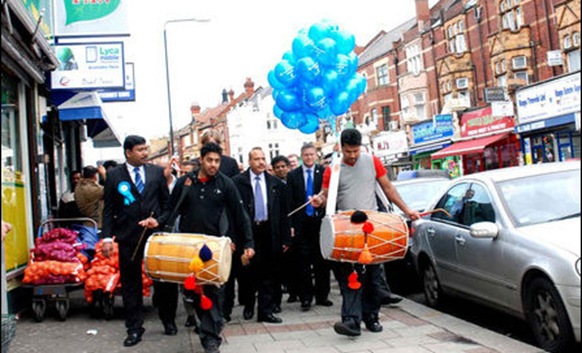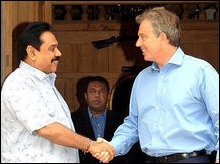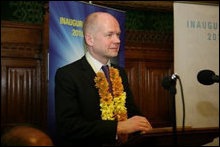It’s a sight that would have been incongruous a few years ago, but is almost unremarkable today. Nestled amongst the Tamil restaurants, grocery shops and other businesses on the main strip in Rayners Lane, a suburb of London, a large sign on the front of former store front says: ‘British Tamil Conservatives’. On the other side of London, another office of the BTC opened a few weeks ago with a lamp lighting ceremony accompanied by mirithungam drummers, directly opposite the tube station in the Tamil-dominated suburb of East Ham.

These are some of the visible signs of changes in Tamil expatriates’ engagement with British politics: from long-standing, almost taken-for-granted, support for the left-leaning Labour party and Liberal Democrats, to fresh consideration of the centre-right Conservative Party. There are several drivers for these, both within and outside the Diaspora.
 On the one hand, gradual socio-economic, political and demographic changes over the past two decades amongst the Tamil Diaspora have resulted in an established and successful community, one which has increasingly been participating actively in British political and electoral processes.
On the one hand, gradual socio-economic, political and demographic changes over the past two decades amongst the Tamil Diaspora have resulted in an established and successful community, one which has increasingly been participating actively in British political and electoral processes.
On the other hand, the Conservative Party is engaging with British Tamils, arguably for the first time. Alongside hardnosed electoral calculations compelling all major parties’ attention to politically active communities across the country, the Tory leadership is also listening to those within the party taking a principled position on Sri Lanka’s conduct towards the Tamils.
Conservative candidates have increasingly spoken at Tamil political and cultural events, treading boards once the preserve of Labour and Lib Dem figures. Senior Tory leaders have held discussions with representatives of Tamil groups.
 At the launch of the Global Tamil Forum in February – a day long event held at the UK Houses of Parliament – both the Foreign Minister, David Miliband, and his opposition counterpart, William Hague, addressed the meeting, the former giving the opening speech, the latter the closing speech. Prime Minister Gordon Brown and Leader of the Opposition David Cameron sent salutary messages.
At the launch of the Global Tamil Forum in February – a day long event held at the UK Houses of Parliament – both the Foreign Minister, David Miliband, and his opposition counterpart, William Hague, addressed the meeting, the former giving the opening speech, the latter the closing speech. Prime Minister Gordon Brown and Leader of the Opposition David Cameron sent salutary messages.
Such engagement with Tamil politics by senior British leaders is a major development, but the most unexpected is that of the Conservatives, once seen as implacably hostile to and uninterested in Tamil sentiments.
The Tories’ inroads have arguably been paved by the Labour government’s acquiescence and active support in the past few years for Sri Lanka’s murderous onslaught in the Tamil homeland, a policy which has increasingly alienated large numbers of Tamils.
There is anger especially over the government’s impassivity during the 72-day mass protest staged by the Diaspora this time last year – as well as a violent police crackdown on the second day. Whilst some Labour MPs met with their constituents during escalating protests and widespread international agitation over the mass killings, the Labour ministers’ responses have lagged behind other international voices.
But its not the Tamil question alone that’s at play. Whilst the plight of Tamils in Sri Lanka is at the forefront of Diaspora politics, the key questions facing Britain’s electorate are also the subject of intense debate in expatriate homes: the economy, taxes, public health, law and order, and, inevitably, foreign policy. With a number of British Tamils having settled in UK following years of residency in other European states, the debate over European integration has a distinct flavour.
In all these regards, all three main parties have support amongst the Tamils, drawing voters, donors and campaigners. The activist group ‘Tamils for Labour’ has been pounding the pavement, holding public meetings and fundraisers and going door-to-door. An equally long-standing and vigorous group of Tamils have been campaigning for the Liberal Democrats.
The British Tamil Conservatives are a relatively new formation, but one reflecting emergent interests amongst the Diaspora. Having largely arrived in the eighties and nineties in Britain – as in many other Western states – Tamils have gradually established themselves economically and socially. Whilst a host of small and now not-so-small Tamil-owned businesses have flourished, a large number of second generation Tamils are doing well in the professions.
These developments have produced a not insignificant pool of potential Conservative voters. Shrewdly, party leader David Cameron marked the Tamil New Year last week with a pointed gesture.
“The British Tamil community have made a great contribution to life here in Britain – and that contribution is built around some important values: family, community, enterprise and responsibility. These same values are shared by the Conservative Party,” he said in a statement.
“So as you gather with your families and friends to celebrate this important festival, I would like to send you and your families my very best wishes for the New Year.”
Cameron’s statement easily eclipsed an attempt by the Labour Party to also reach out to the Tamils, by including in its 2010 manifesto an explicit reference to Sri Lanka’s ongoing crisis.
“We strongly support reconstruction and reconciliation in Sri Lanka. We believe that both the LTTE and the Government of Sri Lanka must be held to account for the loss of civilian life, and we will continue to urge the Sri Lankan Government to fulfill its commitment to a full and fair investigation into war crimes committed in the final months of the civil war,” the manifesto said.
Activists from Tamils for Labour have been playing up the manifesto on the campaign trail, but privately admit the conservatively worded text is proving a hard sell, particularly given the party’s lengthy period in office.
Conservative activists leafleting in East Ham are blunt. “This [Labour] government banned the LTTE, urged EU to do the same and supplied weapons to Sri Lanka,” one declares. “When the mass killings began, they refused to meet us [protestors] – even though when we were right there, outside [parliament]. Now, with the election looming, they’ve remembered we’re around.”
Nonetheless, these are no certainties for any party. Both Labour and the Lib Dems have had long standing engagement with the Diaspora. Several Tamils have served as councilors for both parties and MPs from both have had loyal Tamil constituents for many years. However, several young Tamils have now also joined the Conservative party intending to run as councilors.
The revelation that prominent Labour and Tory MPs have been enjoying the hospitality of the Rajapakse government and quietly lobbying for it at Westminster has been damaging. An SMS campaign titled ‘No Love for Love’ has highlighted Labour MP Andrew Love’s links to Colombo, while similar trips by the Shadow Defence Secretary Liam Fox circulated on emails.
Amid the uncertainty and volatility, politicians in constituencies with significant number of Tamil residents are engaging more closely with the Sri Lanka question – just as the Tamils are increasingly navigating the political processes of their once host, but now home, country.
(For updates you can share with your friends, follow TNN on Facebook and Twitter )
